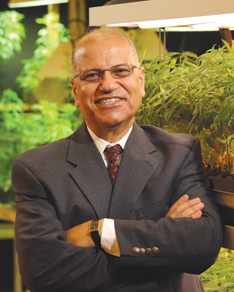… Developers hopes to put brakes on poison ivy rash
OXFORD, Miss. – Hapten Sciences Inc. of Memphis, Tenn., has licensed a compound developed by ElSohly Laboratories Inc. and University of Mississippi pharmaceutical researchers to prevent reactions to poison ivy, oak and sumac.
The compound, HPT-721, is being developed for the prevention of contact dermatitis secondary to poison ivy, oak and sumac. The molecule contains chemical derivatives of urushiol (u-ROO-she-ol), the oily substance in the plants that causes dermatitis.
“Our HPT-721 molecule provides a completely new solution to the problem of urushiol exposure,” said Raymond J. Hage Jr., president and CEO of Hapten. “We are enthusiastic about the significant potential health benefits of this product candidate.”
The compound “demonstrated efficacy in an accepted animal model used in preclinical studies,” said Mohammad K. Ashfaq, a veterinarian and senior scientist in the National Center for Natural Products Research at the UM School of Pharmacy.
The scientist behind the compound is an NCNPR research professor, Mahmoud A. ElSohly, who is also president and director of ElSohly Laboratories of Oxford. ELI’s synthetic chemist, Waseem Gul, produced the compound, and preclinical development studies were conducted at ELI and NCNPR with more than $800,000 from the National Institutes of Health Small Business Technology Transfer Program, or STTR.
The compound is water-soluble and has demonstrated long-term stability in aqueous solution, ElSohly said, so it will be developed as an intramuscular injection, like many flu shots. Next development steps include final formulation analysis, completion of manufacturing processes and toxicology studies. Hapten plans to file an Investigational New Drug Application with the U.S. Food and Drug Administration and begin clinical trials in 2012.
Hypersensitivity to poison ivy develops with repeated exposure to the plants, Ashfaq said.
“The first time people are exposed, there is no reaction,” he said. “The second time they are exposed, they get the flared reaction typical of poison ivy dermatitis – the redness and blistering.”
Each year, nearly 50 million Americans develop that irksome skin rash, resulting in more than 7 million visits to health care providers.
“Hapten Sciences’ officers and board members have significant experience in the pharmaceutical industry,” said Walter G. Chambliss, UM’s director of technology management. “We are excited they are partnering with us to develop our new prophylactic treatment.”
Hapten Sciences, a privately held biopharmaceutical company, is dedicated to identifying and developing novel, early-stage products with potential for contributing to the health and well-being of people around the world. Hapten is backed financially by MB Ventures Partners, also headquartered in Memphis. For more information about Hapten Sciences, visit http://www.haptensciences.com.
ElSohly Laboratories is a small Mississippi corporation dedicated to servicing the drug-testing industry and is heavily involved in pharmaceutical research and development. For more information about ELI, visit http://www.elsohly.com.
The UM School of Pharmacy has earned international recognition for accomplishments in education; basic, translational and clinical research; and professional community service. Its National Center for Natural Products Research is the nation’s only university research center devoted to improving human health and agricultural productivity through the discovery, development and commercialization of pharmaceuticals and agrochemicals derived from plants, marine organisms and other natural sources.
For more information about the School of Pharmacy, call 662-915-7265 or visit http://www.pharmacy.olemiss.edu.
